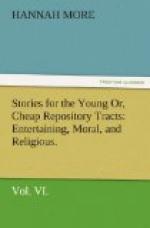Now I also saw in my dream, that there were two roads through the wilderness, one of which every traveller must needs take. The first was narrow, and difficult, and rough, but it was infallibly safe. It did not admit the traveller to stray either to the right hand or to the left, yet it was far from being destitute of real comforts or sober pleasures. The other was a broad and tempting way, abounding with luxurious fruits and gaudy flowers to tempt the eye and please the appetite. To forget the dark valley, through which every traveller was well assured he must one day pass, seemed, indeed, the object of general desire. To this great end, all that human ingenuity could invent was industriously set to work. The travellers read, and they wrote, and they painted, and they sung, and they danced, and they drank as they went along, not so much because they all cared for these things, or had any real joy in them, as because this restless activity served to divert their attention from ever being fixed on the dark and shadowy valley.
The King, who knew the thoughtless temper of the travellers, and how apt they were to forget their journey’s end, had thought of a thousand little kind attentions to warn them of their dangers. And as we sometimes see in our gardens written on a board in great letters, “Beware of spring-guns”—“Man-traps are set here;” so had this King caused to be written and stuck up, before the eyes of the travellers, several little notices and cautions, such as, “Broad is the way that leadeth to destruction;” “Take heed, lest ye also perish;” “Woe to them that rise up early to drink wine;” “The pleasures of sin are but for a season.”
Such were the notices directed to the Broad-way travellers; but they were so busily engaged in plucking the flowers, sometimes before they were blown, and in devouring the fruits, often before they were ripe, and in loading themselves with yellow clay, under the weight of which millions perished, that they had no time so much as to look at the King’s directions.
Many went wrong because they preferred a merry journey to a safe one, and because they were terrified by certain notices chiefly intended for the Narrow-way travellers, such as, “Ye shall weep and lament, but the world shall rejoice;” but had these foolish people allowed themselves time or patience to read to the end, which they seldom would do, they would have seen these comfortable words added: “But your sorrow shall be turned into joy;” also, “Your joy no man taketh from you;” and, “They that sow in tears shall reap in joy.”




